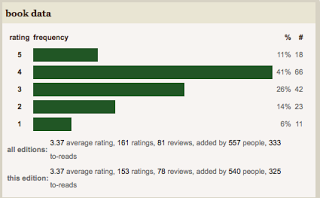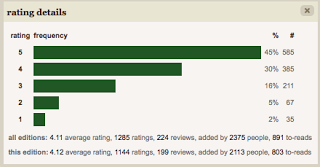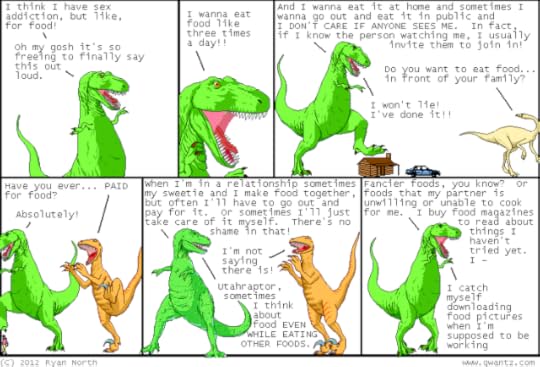Helen DeWitt's Blog, page 20
March 9, 2012
if Buñuel had been into dinosaurs...
Published on March 09, 2012 13:43
March 8, 2012
will have had gone
One of the major problems encountered in time travel is not that of becoming your own father or mother. There is no problem in becoming your own father or mother that a broad-minded and well-adjusted family can't cope with. There is no problem with changing the course of history—the course of history does not change because it all fits together like a jigsaw. All the important changes have happened before the things they were supposed to change and it all sorts itself out in the end.
The major problem is simply one of grammar, and the main work to consult in this matter is Dr. Dan Streetmentioner's Time Traveler's Handbook of 1001 Tense Formations. It will tell you, for instance, how to describe something that was about to happen to you in the past before you avoided it by time-jumping forward two days in order to avoid it. The event will be described differently according to whether you are talking about it from the standpoint of your own natural time, from a time in the further future, or a time in the further past and is further complicated by the possibility of conducting conversations while you are actually traveling from one time to another with the intention of becoming your own mother or father.
Most readers get as far as the Future Semiconditionally Modified Subinverted Plagal Past Subjunctive Intentional before giving up; and in fact in later editions of the book all pages beyond this point have been left blank to save on printing costs.
comment on Languagehat. Who does not normally draw attention to items on Language Log, assuming most readers will be reading LL anyway. (I know I do.) But could not resist discussing a post on LL on a tense that was certainly new to me: will have had gone.
Published on March 08, 2012 15:10
February 20, 2012
baffled
Came via the Book Bench to a piece on Publishers Weekly by a book addict, a man who habitually goes to bookstores with no particular book in mind and walks out with three or four. He thinks he has too many books. He comments that most of the books are unread. (He has read 85 of 371.) He likes to think being surrounded by so many unread books is an expression of aspiration, on the whole a good thing.
Commenters then offer advice. The advice given in at least a couple of cases is be ruthless and get rid of UNread books.
Commenters then offer advice. The advice given in at least a couple of cases is be ruthless and get rid of UNread books.
Published on February 20, 2012 22:57
friends in strange places
I went into Niedrige Preise to look at cacti. The security guard greeted me like a long-lost friend - Wie geht's? he asked, beaming, and continued to beam while making other friendly remarks. I was somewhat baffled, though I smiled and made some sort of friendly reply. Later I remembered that this security guard had once stopped me and asked to search my bag. I had gone into NP after shopping at Kaiser's, had decided not to pick anything up at NP and so had simply walked past the check-out line. The guard had then asked to see my Kaiser's bag. I explained that I had been at Kaiser's and showed the receipt, which corresponded to the items in the bag; he apologised profusely, I assured him that it was completely understandable, and this, I think, is the basis of this unguessed-at friendship. (Perhaps he is simply relieved to find I am not boycotting Niedrige Preise.) This time, anyway, I happened to find a tiny stollen, which turned out to cost an amazing .50, so was not engaged in the suspicious activity of entering and leaving without buying.
Published on February 20, 2012 21:24
Jane Dark goes dark
Andrew Gelman followed the link on the blogroll to Joshua Clover's site and found that it had been taken over. (And all this time the link was sitting innocently on the blogroll...)
Published on February 20, 2012 18:49
Got an e-mail from a friend who had listened to the podca...
Got an e-mail from a friend who had listened to the podcast with my sister. He said she laughed and said it was 'just like Helen'. This is strangely terrifying.
Published on February 20, 2012 14:58
February 17, 2012
bookses
Piece in the Guardian on Zero Books, with interviews of many of its authors . . .
[NB Nina Power has deleted all posts on Infinite Thought before the riots of 2011 as callow stuff 20s crap. I've heard from young editors in New York who were inspired by, er, all the callow stuff that has now been deleted from Power's blog -- readers may the ever-present possibility of de-publication is precisely where a blog has its drawbacks.]
The whole thing here.
SS: What was the background to your involvement in Zer0?
MARK FISHER: When Zer0 started, I was very conscious that the culture which formed me – free higher education; innovative public service broadcasting; a music press that unashamedly engaged with theory – was disappearing. In place of this egalitarian space, where concepts and theories could be encountered in popular contexts, there was a rigid split between, on the one hand, specialist academic writing that didn't engage anyone and wasn't really supposed to, and, on the other, facile populism. Zer0 wanted to disrupt this; it wagered on people's intelligence and appetite for writing that was lucid but conceptually dense.
The Zer0 project promised to make available the kind of writing that I wanted to read myself but which you couldn't read anywhere except online. I belong to a lost generation, really, one forced into online exile online by the lack of space in print culture for the kind of writing I was doing – writing that's too journalistic to be academic, and too theoretical to count as journalism. I'd got so habituated to this exile that, before the first books were published, it was hard to believe that the books would ever actually come out, still less be successful.
...
SS: Does a physical book perform certain kinds of function more effectively or differently from blogs or ebooks?
NINA POWER: The thing that really surprised me was the very different status a book still has in people's minds, even if the arguments and the texts have already appeared online in blogs and journals (which is where most of One-Dimensional Woman came from). The book still retains a curiously weighty status in comparison to blogs. A book is a snapshot of whatever it was you felt was interesting at that moment, and it's fixed in aspic, which can have its drawbacks.
[NB Nina Power has deleted all posts on Infinite Thought before the riots of 2011 as callow stuff 20s crap. I've heard from young editors in New York who were inspired by, er, all the callow stuff that has now been deleted from Power's blog -- readers may the ever-present possibility of de-publication is precisely where a blog has its drawbacks.]
SS: How do you see the relationship between pop music and "criticality" these days?
OWEN HATHERLEY: The writing many of us encountered in the music press in (roughly) the 80s-mid 90s was exemplary in its combination of mass audience, unpatronising erudition, politicisation and fearless, sometimes experimental prose, and it is in lots of ways a model for what we tried to do with Zer0. That world rather disappeared in the late 1990s and then reappeared on the internet, with blogs by Simon Reynolds, Mark Sinker, Ian Penman, Taylor Parkes. The writing has become more distant from contemporary music, for reasons that are debatable – certainly music doesn't seem to articulate conjunctural events as it used to; to use a banal example, a Ghost Town for last year's riots is now inconceivable, so broken is that link between the streets, the music press and the charts. So we're trying to produce the same sort of writing but on completely different subjects.
The whole thing here.
Published on February 17, 2012 15:37
February 15, 2012
February 13, 2012
corruption in a minor key
1. If you teach, and select texts for your courses on the basis of which poets (not poetry) you likepersonally, or owe a favor to, or are part of an organization with, or want to impress, and not onthe basis of a text's pedagogical utility -- its value to those you were hired to teach and whoseintellectual welfare is partly your responsibility -- you may be a tiny bit corrupted.
2. If you slander or libel poets you don't know based not on information you actually have butyour own personal guesses about what type of person they might be, and / or a disagreement theyhad with a friend of yours many years ago, and can't find it in yourself to forgive and / or forgetbut instead only to pass your bitterness on to others down through the years, you may be a tinybit corrupted.
3. If you can't take joy in the successes of friends and / or those who are not friends but whosework you recognize as having substantial artistic merit, you may be a tiny bit corrupted.
4. If you choose when and where to write a poetry review on the basis of personal allegiancesand not genuine admiration for the work you're reviewing, you may be a tiny bit corrupted.
5. If you choose which poets to read based on anything other than your admiration for their work-- their clothes, their haircut, their power and influence, their friends, the extent to which you seethem or their lives as a mirror of your own, their physical proximity to you or to someone/something you want -- you may be a tiny bit corrupted.
Seth Abramson, Northern Poetry Review, courtesy (wie so oft) Woods Lot, the rest here
Published on February 13, 2012 18:42
February 11, 2012
infra dig
I recently read a discussion between Nathan Englander and Jonathan Safran Foer in the Guardian (they were talking about their new edition of the Haggadah, translated by NE and edited by JSF). JSF said he did not read reviews. A fortiori I'm guessing he does not check out GoodReads and then dig down to the stats on ratings. If one is going to indulge in this undignified practice I can't help feeling the best plan is to keep quiet about it. But! We have data! (You know my weakness for data.)
Lightning Rods was rejected by 17 editors when Bill Clegg sent it out; it was rejected by another 4 or 5 years earlier; this looks like a unanimous rating of <= 2 stars.
Here is a dear little bar chart from GoodReads:

This isn't quite what I would expect the distribution to look like if people either loved it or hated it, which (editorial consensus notwithstanding) seemed to be the response among people who read it pre-publication, but there's certainly much more variation than among readers of The Last Samurai:

I contemplate the fact, though, that many of the people who HATED the book are of my mother's generation - and my mother HATES COMPUTERS. She tried e-mail, grudgingly, for years; six years into the trial she had not gone online once to check out a website. So she would certainly not sign up for GoodReads; if the sort of person likely to hate the book is also the sort of person unlikely to sign up for GoodReads, this would naturally affect the distribution.
How much easier life would have been, I can't help thinking, anyway, if the distribution among editors had matched that of readers on GoodReads. Or rather -- it's so complicated with editors. Bill said 16 out of 17 editors thought the book was funny and well written but they could not see publishing it, which maybe means they anticipated most readers giving it a rating <= 2 stars. Would an anticipated distribution like that of GoodReads have tipped the balance? (How much easier life would have been had the distribution of editors anticipating a distribution like that on GoodReads matched the distribution on GoodReads . . .) But regrets are fruitless. On with the show.
Lightning Rods was rejected by 17 editors when Bill Clegg sent it out; it was rejected by another 4 or 5 years earlier; this looks like a unanimous rating of <= 2 stars.
Here is a dear little bar chart from GoodReads:

This isn't quite what I would expect the distribution to look like if people either loved it or hated it, which (editorial consensus notwithstanding) seemed to be the response among people who read it pre-publication, but there's certainly much more variation than among readers of The Last Samurai:

I contemplate the fact, though, that many of the people who HATED the book are of my mother's generation - and my mother HATES COMPUTERS. She tried e-mail, grudgingly, for years; six years into the trial she had not gone online once to check out a website. So she would certainly not sign up for GoodReads; if the sort of person likely to hate the book is also the sort of person unlikely to sign up for GoodReads, this would naturally affect the distribution.
How much easier life would have been, I can't help thinking, anyway, if the distribution among editors had matched that of readers on GoodReads. Or rather -- it's so complicated with editors. Bill said 16 out of 17 editors thought the book was funny and well written but they could not see publishing it, which maybe means they anticipated most readers giving it a rating <= 2 stars. Would an anticipated distribution like that of GoodReads have tipped the balance? (How much easier life would have been had the distribution of editors anticipating a distribution like that on GoodReads matched the distribution on GoodReads . . .) But regrets are fruitless. On with the show.
Published on February 11, 2012 20:31
Helen DeWitt's Blog
- Helen DeWitt's profile
- 624 followers
Helen DeWitt isn't a Goodreads Author
(yet),
but they
do have a blog,
so here are some recent posts imported from
their feed.




